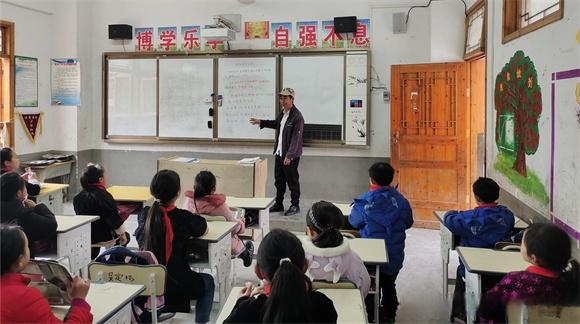Implementing "Double Reduction" to Promote Inheritance and Intangible Cultural Heritage Culture Entering Huanggang Primary School
"Listen quietly, I will sing a song to tell you that the spring and spring are beautiful in March, the land should not be abandoned, the labor in the mountains should not be forgotten, and people should not be careless..." Recently, the author walked into Shuangjiang, Liping County, Qiandongnan Prefecture, Guizhou Province. The campus of Zhenhuanggang Primary School was deeply attracted by the immature children's songs of the Dong nationality.

Erudite and happy to learn, self-improvement. In the classroom, the singer compiled national policies such as production safety and farmland protection into Dong songs. The children followed the tune of the pipa, opened their hearts and sang with their throats open, and the campus was full of sunshine and vitality for a while.
Huanggang Dong Village is one of the nearly 100 traditional Chinese villages in Liping County. The ethnic culture here is rich and colorful.
In recent years, in order to carry forward the excellent traditional culture and enrich the campus life, Huanggang Primary School has introduced more than 10 traditional cultures such as Dong nationality songs, corbel songs, pipa playing, and singing halls into the campus and classrooms, promoting the campus culture with local characteristics. , injecting new vitality into the development of education.
"At present, every class in our school has an ethnic culture class, which is held once a week, mainly to teach Dong songs. At the same time, an extra-curricular ethnic culture interest class has also been set up. Students can choose Dong songs, pipa or erhu according to their own preferences. Learning, the enthusiasm of the students is very high now, and their courage, eloquence and performance talents have been well exercised." said Yang Xianrui, the principal of Huanggang Primary School.
According to reports, Huanggang Primary School's introduction of "intangible cultural heritage" culture into the campus has received strong support from the villagers. Dong singers, pipa masters, and erhu inheritors in the village have sent traditional culture to the campus, thereby stimulating students' self-confidence and enthusiasm for learning.
As the inheritor of the great songs of the Dong ethnic group in Liping County, the "singer Wu Chenglong in the Dong Village works during the day, organizes the songs at night, translates the lyrics into texts in easy-to-understand language, and then goes to the school to teach the children sentence by sentence. The students learned to sing line by line... The classroom was full of cheers, and the students were very interested.
"After I was discharged from the army in 1999 and returned to my hometown, I found that the Dong songs in my hometown were very nice and interesting to translate. In order to pass on this treasure left by my ancestors, I started to learn Dong songs, and now I mainly want to translate these good songs. The songs are passed on to the children, so that the children can be educated in the singing and learn the truth of being a human being." Wu Chenglong was deeply touched by the mention of the ethnic culture entering the campus.
It is understood that since the introduction of "intangible cultural heritage" culture into the campus, Huanggang Primary School has actively absorbed excellent national culture and introduced professional teachers, and urged the inheritance work to be effective. At present, there are 7 teachers specializing in ethnic culture, 11 "intangible cultural heritage" cultural items have been introduced, 8 interest groups for extracurricular activities and 6 ethnic song and dance performance teams have been established.
Today, in Huanggang Primary School, the sound of reading, singing, and laughter accompany every day in the beautiful campus. In the local "June 15 Shouting Festival", "Drum Tower Song on the seventh day of the first lunar month", "June 6th" traditional national festivals and "Dong Nationality Song Hundred Villages Singing Contest" and other activities, the school organizes students to participate in off-campus performances. The colorful activities have not only cultivated students' talents in all aspects and improved their comprehensive quality, but also achieved remarkable results in promoting quality education and implementing the national "double reduction" policy.
 渝公网安备 50010702504639号
渝公网安备 50010702504639号